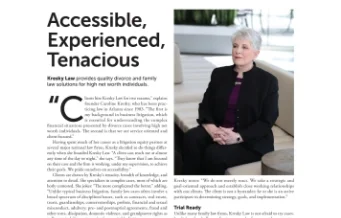Post-Judgment and Appeals
When a judge makes a decision and enters an order in a Georgia family law case, one of the parties is going to be dissatisfied with the outcome. However, when a negative ruling happens because of an error by the court, there are options for post-judgment and appeals. You may have grounds to have an appellate court take another look at mistakes during the trial, and you might obtain a favorable result. At the same time, you might be in a position where you want the trial judge’s decision to stand because it was correct.
Regardless of your position, it is critical to understand the complexities of post-judgment remedies under Georgia appellate rules. Retaining experienced legal representation is essential, so please contact Kresky Law to learn how we support your needs. We can set up a case review with an Atlanta post-judgment and appeals lawyer who will offer personalized advice. You may also benefit from reviewing some basics about what to expect.
Family Court Decisions Subject to Appeal
The appellate process aims to correct errors or make clarifications on issues that were before the trial court. With family law matters, the most common decisions that parties appeal involve property division, details regarding spousal support, and child custody, visitation, and support.
Only a final order entered by the court is subject to appeal. Many of the orders signed by a judge during a divorce or family law case are not final; only the last decree is appealable. In addition, some family law cases may be filed as direct appeal. Others are discretionary and require court approval to seek post-judgment relief.
Potential Results with Appeals
By appealing the order in a divorce or family law case, you are not retrying the issues before the trial court. The appellate court will only address the error pointed out by the appellant who wants review. The judges may agree with the appellant, at which point they may order:
- Reversal of the finding
- Remand to the trial with instructions on how to fix the mistake
- Instruct the court that evidence is inadmissible
If the appeals judges do not agree with the appellant’s arguments, the trial court’s findings remain in effect.
Legal Help with Post-Judgment Relief
Quick action is essential with appeals, and our Atlanta post-judgment and appeals lawyers at Kresky Law are prepared to move. Time is of the essence, as you have 30 days from entry of the final order that you want to contest. We will:
- Handle the notice for appeals
- Obtain the trial court record
- Prepare all legal briefs with arguments and support on the errors made at the trial level
- Attend oral arguments if ordered by the court
Speak to an Atlanta Post-Judgment and Appeals Attorney About Your Options
An overview on appeals in family law cases is useful, but you can see that it is critical to retain legal help with the process. To learn how we can assist with your options, please contact Kresky Law to schedule a consultation. A knowledgeable Georgia appeals lawyer can explain details after reviewing your situation.


